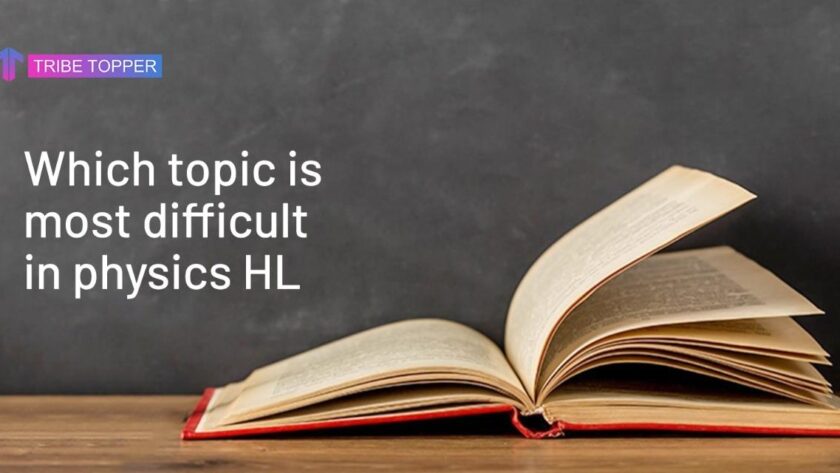The question asked by most of the students in which topic is the most difficult in IB Physics?
But this is the wrong question because a topic which is difficult for me is not necessary that it has to be difficult for you too.
IB Physics is a great subject to elect. It is entirely not a Math focused as some people might think. It’s possible to get something like 4 or even 5 if you’re completely blind at Math. So if you can do some Math, the subject becomes much more accessible. Like any other IB subject, it requires a lot of practice and studying. Personalized learning in IB Physics can help students learn at their own pace and focus on their individual strengths and weaknesses. If you think that you can get good grades in IB Physics without working hard, you are wrong.
Let’s get back to the point. I have noticed a pattern among a number of students, and the topics which are rated most difficult by most of the students are
- Waves (Topic – 4 and 9)Electricity and Magnetism (Topic – 5)
- Quantum and Nuclear Physics (Topic – 12).
Why do these topics look hard?
Practice makes a man/woman perfect – Isn’t this true!
These topics are not that tough, but students don’t practice enough, and thus these chapters become extremely hard to understand.
For example – In the simple harmonic motion topic, all you need is to understand how to interpret a graph. You need to understand how to find the amplitude, wavelength, frequency, or time period from the graph and read the quantities and units measured on each axis. WOW, it wasn’t that simple.
Therefore for all of the topics, you need to go through your notes and jot down the important formulae and definitions. Practice all the problems on each type of formulae.
What do you have to do?
IB Physics is very interesting; difficult subjects like Quantum Physics are also included in the High-Level Syllabus. Doesn’t that sound cool? It would help if you put in your effort and hard work to get a good grade.
You need to learn Math and have a good understanding of it. This will make difficult concepts in Physics easier. You also need to know your definitions and should be able to explain the processes in the questions.
My personal opinion is that waves and oscillations are the hardest topics in IB Physics HL. There are a few tricky and difficult questions from the SL and HL Parts.
To approach a mathematical problem:
- Write down all the parameters given and the unknown quantity to be determined.
- Try to recall or check from the data booklet which formula relates all the given quantities and plug in the values.
- Remember to use S.I Units for each quantity.
In waves, you should read the question carefully and figure out if it is a problem based on the single slit, double slit, or if there are too many slits, then it’s a diffraction grating problem. To identify the type of problem, you should have gone through each concept and cleared it. Use the textbook, class notes, or quick key concepts from various online sites and brush it up. IB Physics students can prepare for NEET by focusing on the core concepts covered in the syllabus and practicing with NEET-style questions.
The best way to practice questions is to solve a complete set of past papers, this will help you understand all possible exam-style questions, and this revision will be very helpful.
While solving a problem, first of all, write the correct formula. Do not start with values straight away. Some questions can appear confusing at first glance, but you may figure out the steps needed if you read them carefully.
Electricity and Magnetism and Electromagnetic Induction.
The next most difficult topic observed by students is topic 5- Electricity and Magnetism, and Topic 11- Electromagnetic Induction.
The three Key rules: need to be clear to ace these topics and easily solve direction-based problems.
1. Right-hand thumb rule,
2. Fleming’s left-hand rule
3. Fleming’s right-hand rule
Topics like thin films can seem especially should be practiced a lot. Try to solve as many questions from past papers based on thin films and analyze the marking scheme.
The marking scheme or study of detailed solutions available on some websites for IB Physics can be helpful.
If you have opted for HL Physics, you should be prepared and be regular from the beginning of the session.
Electricity and magnetism are mostly mathematical problems based on standard formulae. Generally, they are based on a series or parallel combination of resistors, factors affecting resistance, Ohm’s law, and Kirchhoff’s laws. First, be clear with the laws and then understand their applications by solving problems.
Topic 10 Fields is another difficult part that is a tricky one. It is not a very long chapter, so you spend some time understanding and then practice its questions.
Some students also find Topic 12, Quantum and Nuclear physics, the most difficult one. There are too many formulas, and it requires excellent understanding to know when to use which formula, and since this is a relatively an abstract topic, it requires more abstract thinking. So the best would be to take help from some animated videos based on this topic, which can better understand the concept. Physical education can help IB physics students develop a better understanding of the body’s mechanics and how different forces affect it. But you do not have to worry much as this is the least covered topic in the exam, so keep it to the end.
In the end, I would say that it is more important to understand the “why’s” and “how’s” of everything – that’s what a good Physics teacher aims to do, and that’s what leads to all the students getting 6s and 7s. To stay motivated, always start from the easiest chapters. Focus on Mechanics, and then all the topics would be easier to understand.
So my friends, to achieve a 7 in IB Physics, you need to
1. Be regular in your studies, don’t skip your homework
2. Practice past papers and topic wise questions
3. Believe in yourself.
4. And MORE PRACTICE!




